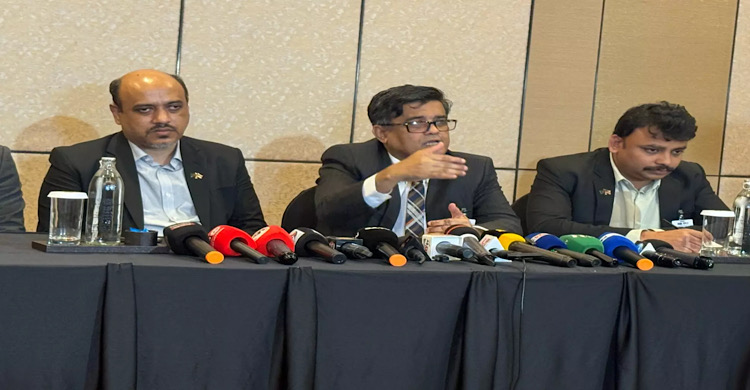Dhaka strongly raises irregular migrant issues with KL: Shafiqul Alam


In an effort to address migrants issues effectively, Bangladesh has strongly raised the issue of 'undocumented or irregular" Bangladeshi migrants with Malaysia’s highest authorities, Chief Adviser’s Press Secretary Shafiqul Alam said on Tuesday night.
"We are coming here frequently. We are having deep and sincere discussions. They (Malaysia) have responded well and remain serious about migration welfare," Alam told reporters while briefing the media at a hotel in Kuala Lumpur.
Chief Adviser’s Deputy Press Secretary Abul Kalam Azad Majumder, First Secretary (Press) at the Bangladesh High Commission in Kuala Lumpur Sufi Abdullahhil Maruf, Senior Assistant Press Secretary Foyez Ahmmad, and Assistant Press Secretary Suchismita Tithi were also present.
In response to a question, Alam acknowledged that there are long-term structural issues in migration management but said efforts are underway to address all migration-related challenges.
He reiterated Bangladesh’s zero tolerance stance against human trafficking.
Describing the talks between Chief Adviser Prof Muhammad Yunus and Malaysian Prime Minister Anwar Ibrahim as “very successful and fruitful,” Alam expressed the hope that bilateral relations would reach new heights.
On trade, he said negotiations for a Free Trade Agreement (FTA) between the two countries will begin soon.
Regarding the Rohingya crisis, Alam said Malaysia will remain engaged with Bangladesh on international platforms to help find a resolution.
Earlier in the day, Prof Yunus, who is paying a three-day official visit, urged Malaysia to keep its doors open for Bangladeshi workers.
During a joint press conference following the official talks—and the signing of five Memorandums of Understanding (MoUs) and the exchange of three notes—Prime Minister Anwar Ibrahim said Malaysia considers Bangladesh an important partner, with Bangladeshi workers playing a key role in the development of both nations.
“We want to thank Malaysia for hosting so many of our people, and we hope this door will remain open and become even wider so that we can send more young people to work in Malaysia and learn valuable skills,” Prof Yunus said.
He said many Bangladeshi workers return home after gaining experience in Malaysia, starting businesses and creating economic opportunities.
“We are very grateful to Malaysia for enabling this,” he added.
Prof Yunus said Bangladesh and Malaysia are growing closer not only due to diplomatic engagement but also because of the strong people-to-people connection forged by migrant workers.
He highlighted that remittances sent home by these workers sustain their families, pay for children’s education, and improve living standards.
“It’s not simply a matter of workers coming from outside to work here. They are happy to work here, and their contributions benefit both countries,” the Chief Adviser said.
